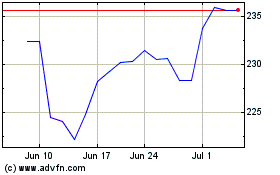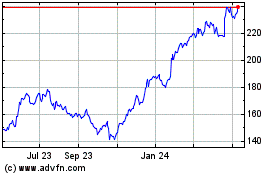Both Sides In AmEx Case Grilled By Justices -- WSJ
February 27 2018 - 3:02AM
Dow Jones News
By Brent Kendall
This article is being republished as part of our daily
reproduction of WSJ.com articles that also appeared in the U.S.
print edition of The Wall Street Journal (February 27, 2018).
WASHINGTON -- American Express Co.'s card rules for merchants
prompted strong reactions at the Supreme Court Monday, as the
justices considered whether to revive a government antitrust
lawsuit challenging the company's approach.
At issue is an AmEx policy that says retailers and other
businesses that accept AmEx cards are prohibited from providing
incentives that encourage customers to pay with cards on other
networks like Visa or Mastercard that charge lower fees.
During an hour-long oral argument, Justices Sonia Sotomayor and
Neil Gorsuch dominated questions from the bench and offered starkly
different views of the case.
Justice Sotomayor told an AmEx lawyer that the company's rules
undermined "the essence of competition" and deprived consumers the
option of receiving discounts for alternative forms of payment.
"If I go to a cash register and the merchant says to me, 'I'll
give you a 1% discount today if you don't use AmEx,' I sit there
and think to myself, 'Do I need the airplane rewards or the train
rewards, or do I want the 1%?' " Justice Sotomayor said. "But this
anti-steering removes that competition."
She spoke more than 35 times during the argument.
Justice Gorsuch, for his part, pressed an attorney for Ohio, one
of 11 states that brought the challenge to the AmEx rules to the
high court. He suggested AmEx, which has a smaller market share
than Visa and Mastercard, doesn't have the market power necessary
to impose anticompetitive terms. He also said AmEx card rewards
provided notable benefits to consumers.
"My question is, do you have any evidence that, on a net basis,
consumers pay more" because of the AmEx rules, Justice Gorsuch
said. "I don't believe you have," he told Ohio State Solicitor Eric
Murphy.
Justice Gorsuch spoke about 30 times during the session.
The outcome of the case wasn't clear, because a majority of
justices didn't signal their views and both sides received tough
questions from the court.
AmEx lawyer Evan Chesler said the fees that merchants pay the
company fuel benefits for consumers.
"Every reward, every seat on a plane to Aruba, every ticket to a
Billy Joel concert, every cash-back reward that's given is a price
discount to the consumer," he said.
Mr. Murphy from Ohio said AmEx's rules "raised the prices that
all four credit-card companies charge merchants."
The Supreme Court's review comes after a federal appeals court
in 2016 ruled for AmEx and threw out the government's case.
The Justice Department and a group of states first sued AmEx in
2010, an early headline case for Obama-era antitrust enforcers.
They won a trial court ruling that barred the company's rules, but
then lost at the Second U.S. Circuit Court of Appeals.
The department under Trump administration leadership declined to
seek Supreme Court review after the appellate loss, but on Monday
it supported the states' position and urged the justices to revive
the case.
The case has high stakes for AmEx's business model but also
could have broader ramifications for other companies that have
multisided business platforms, especially in the tech sector.
Like AmEx, many leading technology companies have markets in
which they do business with end-use consumers on one side of their
business and with merchants and advertisers on the other.
A decision is expected by the end of June.
(END) Dow Jones Newswires
February 27, 2018 02:47 ET (07:47 GMT)
Copyright (c) 2018 Dow Jones & Company, Inc.
American Express (NYSE:AXP)
Historical Stock Chart
From Mar 2024 to Apr 2024

American Express (NYSE:AXP)
Historical Stock Chart
From Apr 2023 to Apr 2024
